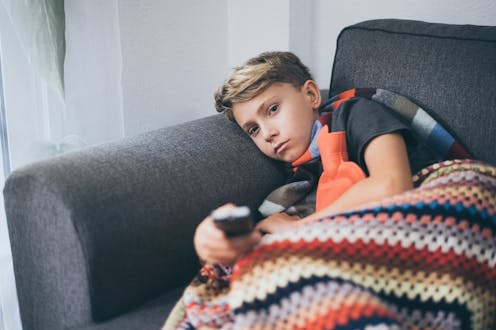If your kid is home sick from school, is unlimited screen time OK?
- Written by Jordy Kaufman, Associate Professor, Swinburne University of Technology

Not so long ago, if a child was home sick from school, the main screen-based entertainment was daytime television. The options were limited to The Price is Right or reruns of Home and Away.
Fast forward to the present day and we have multiple streaming services, tablets, smartphones, and an endless reservoir of content made specifically to captivate children’s attention. Managing a child’s screen time when they’re home sick from school has taken on a whole new dimension.
For many parents, the challenge of juggling work and caring for a sick child at home inevitably leads to more TV or iPad. The digital world offers a convenient solution to keep children occupied and, to an extent, comforted.
But should being unwell automatically equate to increased or even unlimited screen time?
Illness should not automatically equal unlimited screens
We are child development researchers specialising in child-technology interaction and have spent a lot of time thinking about this question. The answer depends on several factors and understanding these elements can help parents manage their child’s screen time effectively and healthily.
The comfort and distraction derived from favourite digital activities – whether it be episodes of Bluey, video games, YouTube videos, or even chatting to friends on social media – might alleviate the discomfort of being unwell. Screen use has been linked to reducing children’s anxiety and pain levels during painful procedures in the hospital.
Still, we should also try to avoid a pattern where every minor illness is seen as a gateway to endless screen time. Over time, this could lead to a situation where children might exaggerate or even feign symptoms of illness to gain extra screen time.
This may also inadvertently teach children that digital consumption is the go-to method for coping with illness-related discomfort or boredom, which could limit their ability to develop healthier coping skills. Recent research also suggests using technology to calm young children too frequently might be linked to higher levels of emotional dysregulation (such as angry outbursts).
Read more: Why am I online? Research shows it's often about managing emotions
How old is your child?
But a child’s age should also be considered. The Australian screen time guidelines for young children and toddlers are less than those for older children.
This means more guidance and support is needed to manage younger children’s use of screens.
But older children also need to have boundaries. Recent research suggests screen use triggers the release of dopamine – which makes you seek out or want to keep doing something – which helps explain why it can be so hard to disengage. There are also continued concerns about the mental health impacts of young people’s social media use.
Read more: Is 13 too young to have a TikTok or Instagram account?
How sick is your child?
The type of illness also plays a crucial role. Some illnesses, such as high fever or flu, necessitate ample rest to aid recovery.
Good quality sleep boosts the immune system helping fight off the infection more efficiently.
But illnesses like mild colds or conjunctivitis may not require as much additional rest, although a reasonable amount of downtime is generally beneficial.
In both scenarios, it’s important to monitor screen time, especially before bedtime. The stimulating effects of screen light can disrupt a child’s sleep, hindering the rest and recovery process.
What are the pre-existing rules in your house?
If your house already has screen time rules for non-school days (such as extra time on weekends or holidays), these can be applied or slightly relaxed when a child is home sick.
Having a baseline – even if it is more generous – makes some screen time limits during a sick day an expected norm. Maintaining these rules can help prevent a free-for-all scenario, which could complicate matters once the child recovers and needs to readjust to their regular schedule.
On the other hand, if there are no pre-existing rules for non-school days, introducing snap strict screen time regulations when a child is unwell may not be the best approach. Doing so could add an additional layer of stress for the child, who is already not feeling sick.
Instead, during these short-term illness periods, parents may choose to be more lenient with screen time, focusing on helping their child recover. Consider sitting down with your child and creating a list of other activities or possibilities that centre on rest and recuperation. Reading, playing with their pet, puzzles, art can all features on these lists.
Read more: Kids' screen time rose by 50% during the pandemic. 3 tips for the whole family to bring it back down
Keep an eye on things
Also, be sure to monitor what children are doing on their screens. Consider supporting decisions that help them rest and then switch off after an agreed period. For example, it might be easier to relax while watching a favourite movie rather than continuously watching new YouTube videos that change every five minutes.
It’s also of course essential to distinguish between entertainment screen use and schoolwork that must be completed on a computer or tablet.
Lastly, in full disclosure, one of the authors was sick with a stomach virus while working on this piece. So they also watched a lot of comfort television and scrolled through Twitter. We shouldn’t expect children to be better patients than adults.
Authors: Jordy Kaufman, Associate Professor, Swinburne University of Technology
Read more https://theconversation.com/if-your-kid-is-home-sick-from-school-is-unlimited-screen-time-ok-207922





